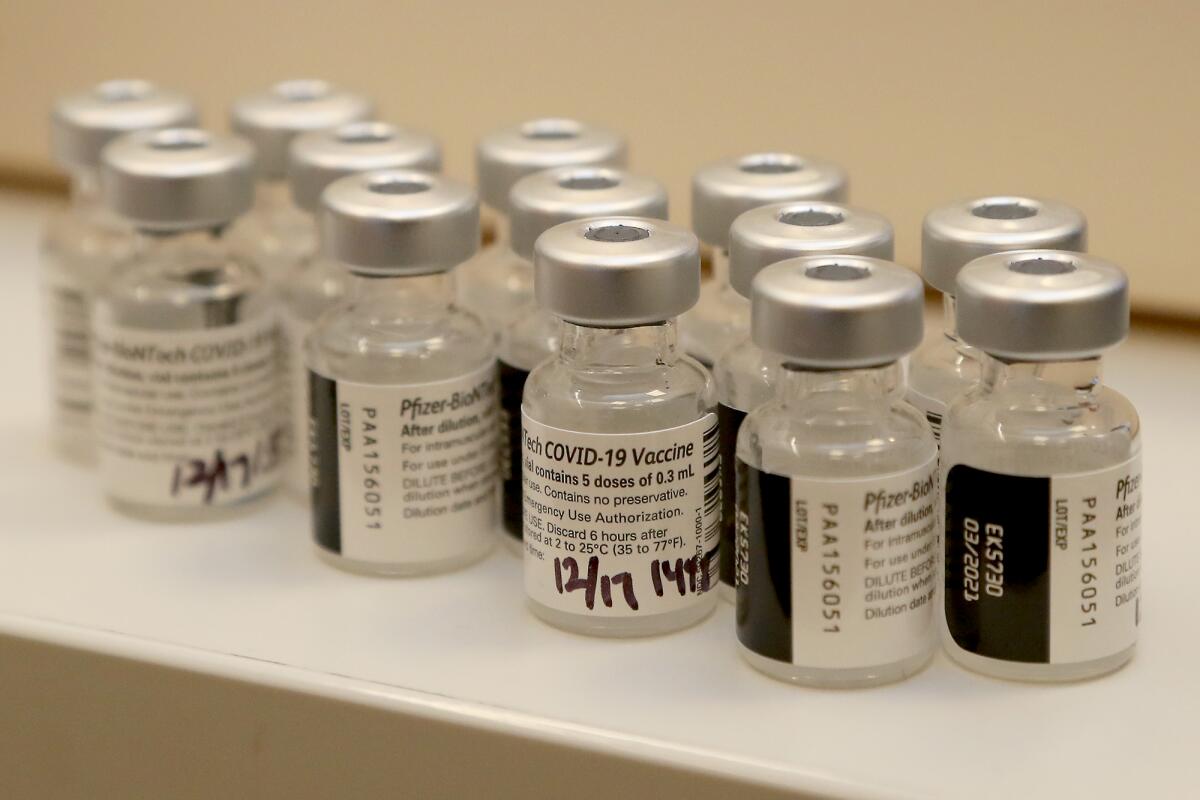Commentary: Reaching out to vulnerable populations about COVID-19 vaccinations

- Share via
With COVID-19 vaccination efforts underway in Orange County, hope runs high that the pandemic will soon end and life will return to normal. But for the 25% of Orange County residents who are low-income Medi-Cal recipients, hope may be tempered by a level of distrust in the vaccine and hindered by other socioeconomic barriers that keep them from pursuing vaccination.
Allowing this population of 800,000 to stay on the sidelines is simply not an option. CalOptima, Orange County’s Medi-Cal plan, and the Orange County Health Care Agency (HCA) are collaborating to launch an equity program, raise awareness and build vaccine acceptance in certain ethnic groups, vulnerable populations and cities disproportionately affected by COVID-19.
Data from both agencies is driving these efforts. CalOptima’s Latino population is 45% of the health plan’s membership; however, data show that 55% of CalOptima’s COVID-19 cases are in members of the Latino population. Furthermore, the HCA’s recent COVID-19 Vaccine Hesitancy Survey shows the effect of location. Only about half of Anaheim, Brea, La Habra, Santa Ana and San Clemente residents are willing to be vaccinated, compared with about 63% of Irvine, Laguna Niguel, Mission Viejo, Newport Beach and Villa Park residents. Cities where more residents are hesitant are the same places where CalOptima membership is higher.
Earlier this month, the CalOptima Board of Directors approved the COVID-19 Vaccine Equity Pilot Program, first introduced by Board of Supervisors Chairman Andrew Do and Vice Chairman Doug Chaffee to improve direct access to vaccinations for CalOptima seniors in the communities hardest hit by the pandemic. CalOptima, clinics and providers are contacting these seniors personally to schedule them for vaccination.
In addition to the equity program, CalOptima and HCA are relying on targeted outreach by community organizations that ethnic populations trust. To amplify the role that doctors play in building trust, these community groups also help spur action and dispel myths and fears. For example, the HCA — under the leadership of the Orange County Board of Supervisors — launched the Latino Health Equity Initiative in June 2020, after testing data showed higher COVID-19 positivity among Orange County’s Latino population. Key partners in the initiative are Latino Health Access, Santa Ana and Anaheim Unified School Districts, the Coalition of Orange County Community Health Centers and others. For the past six months, this initiative has offered increased testing, outreach, education and referral services through “Promotoras” or Health Promoters. The work is now shifting to emphasize vaccine safety and effectiveness.
CalOptima also has close ties with the trusted community organizations that serve low-income residents and is supplying weekly information in a newsletter and other digital resources for their clients. Furthermore, CalOptima has offered the participation of our medical team in joint educational programs that address vaccine hesitancy.
But perhaps the biggest impact on vaccine uptake will be from a program approved in January by CalOptima’s Board — up to $35.4 million in incentives for Medi-Cal members to get the vaccine once it is available to them under the tiered distribution system. The program offers one $25 gift card for each required dose of vaccine received by CalOptima members.
While interpersonal relationships are essential in building trust, financial incentives are effective in getting members to act. CalOptima has ample experience with other health rewards. Last year, we spent more than $450,000 to encourage healthy behaviors such as well child visits, flu shots, cancer screenings and more.
Incentive programs like the one planned for Orange County Medi-Cal members are popping up across the country as insurers and employers seek ways to speed vaccine acceptance and administration. The cost of moving too slow is much higher than the cost of the incentive program itself. Without vaccination rates upward of 70%, we all remain at risk of the pandemic continuing to claim the lives of family, friends and neighbors.
Emily Fonda, M.D., is the interim chief medical officer at CalOptima and Orange County Health Officer Clayton Chau, M.D., Ph.D., is a director on the CalOptima board of directors and director of the Orange County Health Care Agency.
All the latest on Orange County from Orange County.
Get our free TimesOC newsletter.
You may occasionally receive promotional content from the Daily Pilot.





